TOKYO – As a veteran of six straight Paralympics, including the Tokyo edition here, Philippine Paralympic Committee president Mike Barredo noted that each participation of Filipino para athletes in the sports fest posed unique challenges and problems.

But the trials and tests that the PH campaigners faced in their build-up to and taking part in the Tokyo Paralympic Games have been the toughest of them all, according to Barredo, who, although wont to make excuses, blamed the COVID-19 pandemic as the culprit for their ordeal. From the training, qualifying for, and up to the point they actually had to compete in Tokyo, the virus has hounded the national para athletes at virtually every turn, he pointed out.
“While our able-bodied national athletes had problems of their own in finding facilities to train for the Tokyo Olympics, it came doubly hard for our national para athletes,” rued Barredo. “We needed not only accessible training venues but also accessible accommodations for them.
“We practically had no training in 2020 due to the pandemic because our national para athletes were forced to leave the Philsports Complex in Pasig City where they trained and had their quarters because it was converted into a quarantine facility. We understand this reality. It is what it is.”
So he was grateful that the Philippine Sports Commission was able to support and sustain them in looking for separate training bubbles for all six Paralympic-bound athletes for a month or two to do actual workouts before they were scheduled to leave for the Japanese capital.
“In fairness, we have nothing to say but thank the PSC chairman Butch Ramirez for the all-out support they have given our athletes including their separate bubble training before leaving for Tokyo,” Barredo stressed.
He thought that they had left their troubles behind in Manila when key members of the PH Paralympic contingent were grounded because they tested positive for the virus before leaving for Tokyo. Among them were powerlifter Achelle Guion, her coach, Antonio Taguibao, and PH squad chef de mission Francisco “Kiko” Trinidad. But misfortune dogged the contingent to Tokyo when discus thrower Jeanette Aceveda and athletic coach Bernard Buen were infected after undergoing tests, depriving her of the chance of becoming the first visually-impaired Filipino athlete to compete in the meet for the world’s top para athletes.
“I really felt sorry for her because this is a disability we share,” Barredo bared. “It would have been an inspiration to visually-impaired Filipinos that despite all of the challenges it could be done to compete in the Paralympics. It would have been bragging rights for her for being the first.” The PPC chief disclosed that although the athlete was upset for a while “Jeanette has gotten over the issue and vowed to do her best to make it back to the 2024 Paris Paralympics.
“Her plight, in a nutshell, is what the entire team has suffered. Naging problema sa atin yong participation because of COVID-19. It’s a very frustrating and upsetting situation that is out of our control.”
He was proud of what swimmers Ernie Gawilan, Gary Bejino, and wheelchair racer Jerrold Mangliwan had achieved so far despite the adversities in Tokyo.
“Ernie was able to improve his personal bests in his events despite the limited training while Jerrold, except for his disqualification in the men’s 400-meter finals, has also been able to improve a lot, particularly in the 1,500-meter race,” Barredo noted of the two Rio Paralympic veterans.
“Gary is a bit raw this being his first Paralympics. But given more rigorous training and exposure, we expect him to do better in international competition and, hopefully, qualify for the Paris Paralympic Games in 2024,” he said.

